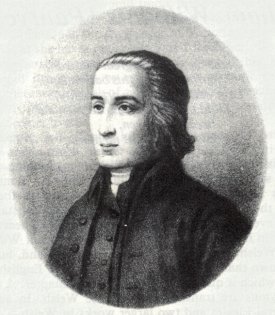Center For Church Music, Songs & Hymns

Browse Hymns:
Browse by:
We Invite You To Sing
To sing with us, 1) Click on the music thumbnail icon to view the sheet music (you don't have to read music!), and 2) Engage the audio file by clicking on the Real audio or Mp3 file.
Find Songs And Hymns
William Williams

- Birth: February 11, 1717, Pantycelyn, Wales
- Death: January 11, 1791, Pantycelyn, Wales
William Williams, born in 1717, in Wales, entered Llwynllwyd Academy at Carmarthen, to study to become a physician. However, when he was twenty, he attended a Sunday morning service lead by an itinerant preacher, Howell Harris. Harris preached from a tombstone in a church cemetery, preaching to people as they left the church service. This "Tombstone Preacher" so touched Williams that he decided to become an evangelist and preach in every possible place.
Williams was ordained a deacon of the Established Church Abergwesyn in 1740, however his evangelistic views kept him from being ordained a priest. Eventually he began to associate with the Welsh Calvinistic Methodists, the group who followed Whitefield in his theological controversy with the Wesleys; Calvinistic, as compared to the Evangelical Arminianism of the Wesleys. This group challenged Williams to update their hymnal by writing hymns. He responded with about 800 hymns, his first "Guide Me, O Thou Great Jehovah." For the wealth of hymns he produced, Williams is sometimes referred to as "the Watts of Wales.
For forty-three years, Williams traveled nearly 100,000 miles on horseback, preaching and singing. One writer states, "He sang Wales into piety." An accomplished vocalist, Williams has been called the "Sweet Singer of Wales." He drew crowds of 10,000 or more, one time speaking to an estimated 80,000 people. He noted in his journal that "God strengthened me to speak so loud that most could hear."
Williams published his first volume of hymns, Hallelujah, in 1744. He also wrote poetry and prose, for use by the members of the Methodist fellowships he established. He wrote two long poems. Golwg ar deyrnas Crist (A view of Christ’s kingdom), written in 1756 deals with the history of salvation and God's grace in Christ. Bywyd a marwolaeth Theomemphus, written in 1764, speaks of conversion and Christian living. He published seven hymnals, two of which were in English. In all, he published nearly ninety books and pamphlets.

